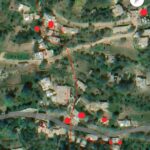A Cluster of Cancer in Aminabad, Karimabad Hunza: A Call for Investigation
The subject Google Maps image presents a glimpse of Aminabad, a small settlement situated in the outlying areas of Karimabad Hunza. At the heart of Aminabad lies a thin red line on the image, representing a shared water passage used by the entire community. This lifeline, vital for their daily needs, might be harboring a sinister secret. The red dots scattered around the line indicate the homes of cancer patients, raising questions about the potential correlation between the water source and the disease. Despite its small population of around 35 families, this community has witnessed an alarming number of cancer diagnoses. With over 17 cases reported in the last ten years, the residents are left grappling with fear and uncertainty. With more than 17 individuals diagnosed with various types of cancer, the rate of incidence in this very small locality is far beyond what would be considered normal. This anomaly has prompted a deep dive into potential environmental factors that could be contributing to this health crisis.
As a resident of this community, the impact of this health crisis is deeply personal. My mother is recently diagnosed with a cancerous tumor in her leg bone, and my wife has endured the pain and suffering of a dangerous tumor that led to the resectioning of five of her ribs. The emotional toll of seeing loved ones battle such a relentless disease is indescribable. It is a heart-wrenching experience that no family should have to endure.
In a community of just 35 families, the diagnosis of over 17 cancer cases in a decade is a staggering statistic. This translates to nearly half of the households being affected by this devastating disease. What makes this situation even more perplexing is that the patients have no genetic relationships with each other. Many of them moved into this locality from outside and developed tumors within the first ten years of their stay.
The high incidence of cancer in such a small community raises several questions about the underlying causes. One potential factor could be the shared water passage that runs through the locality. If this water source is contaminated with heavy metals or radioactive materials, it could explain the prevalence of cancer. A rusty water pipeline or other environmental pollutants could also be contributing factors.
Given the severity of the situation, it is imperative that comprehensive research is conducted to identify the root causes of this health crisis. We urgently appeal to the Aga Khan UniversityHospital, Aga Khan Health Services, the Government of Pakistan, and the World Health Organization (WHO) to take immediate action. A thorough investigation into the water quality, environmental conditions, and other potential risk factors is essential to uncover the truth and prevent further cases.
The residents of Aminabad/Aastana are living in a state of constant fear and uncertainty. The high incidence of cancer in this small community is a clear indication that something is amiss. It is our hope that this article will shed light on the gravity of the situation and prompt the necessary authorities to take swift and decisive action. The health and well-being of our community depend on it.
The writer, M Schaukat hayat, is a resident of Aminabad Karimabad, Hunza.
#akuh #who #AgaKhanHospital #Hunza #oncology #cancer
























